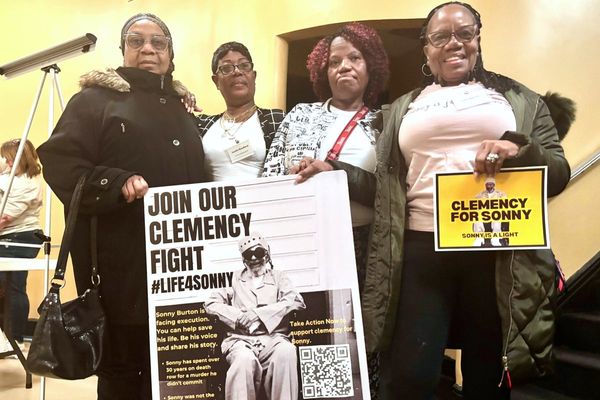LONG ISLAND, N.Y. _ "Tornado _ like tomato."
Seven adults are gathered around two folding tables in the children's room of a library in Valley Stream working on pronouncing the word "tornado."
After sounding out the word and playing around with different stresses on syllables _ like "tor-naah-do" _ it clicked.
The adults are all immigrants to the U.S. Some left behind established careers in finance, engineering and other industries, as well as family members. Now they're students in a new country, working with their teacher to learn English.
The students represent six countries _ Chile, Russia, Colombia, China, Ecuador, and Haiti _ and speak four languages natively _ Mandarin Chinese, Russian, Spanish and Haitian Creole. The free English as a second language (ESL) class, run by the nonprofit Literacy Nassau, gathers twice a week for two hours in Henry Waldinger Memorial Library.
During a recent class, instructor David Leibenhaut assigned a reading about tornadoes in the Midwest, which sparked a conversation about the "Wizard of Oz" _ which none of the students had seen _ and natural disasters that the students had experienced in their home countries.
The conversation would often come back to the students sharing details about their native countries and cultures. When student Ling Ling Zhu explained the Chinese Year of the Pig _ initially pronouncing "pig" with an "a" at the end _ Leibenhaut scribbled the word on his whiteboard and used it as a teaching opportunity for his students.
Zhu, 45, moved 2 { years ago from Chengdu, China, where she worked in finance. She said her teenage son was struggling in school there, and she thought the freedom American students are afforded would be a better fit for him. So the pair moved to Woodmere to allow the now-17-year-old to attend Lawrence Woodmere Academy.
While the move was good for her son, Zhu said she initially struggled with boredom and loneliness, as her husband stayed behind in China for work. But taking English classes for the past year-and-a-half and building relationships with Literacy Nassau has changed that.
Literacy Nassau runs four levels of ESL classes. Students are generally expected to rise from level one, basic language needed for survival, to level four, conversational English, in 12 to 18 months.
Zhu's class is one of the organization's level three classes, which pivots from teacher-driven instruction to peer interaction, Literacy Nassau director Karen Micciche said. Zhu's classmate, Yafen Zhou, who came from China 12 years ago, jumped into the Chinese New Year conversation every now and again to add details or to help Zhu figure out the best way to explain certain traditions in English.
Zhou and Zhu said their children picked up English more quickly than they did.
This could be because children are less bound by the rules of their first language, as they have spent less time learning language rules in a formal setting. Also, children have more time to dedicate to language learning, said Melissa Baese-Berk, an associate professor of linguistics at University of Oregon.
"I think everybody could do a better job of acknowledging the hard work that goes into learning a language _ especially for nonnative speakers of English," Baese-Berk said.
Because the ESL students come from varied backgrounds, they learn nuance from each other, especially in understanding English spoken in varying accents, Micciche said.
English is, as Micciche sees it, a "moderately difficult" language to learn. It is largely phonetically regular _ meaning readers can "sound out" words _ and, like many other languages, it uses the Roman alphabet, she said.
But learning English can be tricky because of rules and pronunciations inherited from other languages from which English takes roots, she added.
Take, for example, the word "canoe." The "oe" in canoe is pronounced differently than it would be in "toe" or "woe," because canoe is derived from the Arawakan word "canaoua."
The students often work together to make sense of the language's complexities. Leibenhaut, a retired English teacher who has been an instructor at Literacy Nassau since 2014, said this teamwork and socialization is just as important, if not more important than the material he teaches.
The students in his previous session became so tight-knit that they went out to lunch after the class ended and still maintain a group chat on WhatsApp where they say good morning to each other every day.
At a recent class Michelle Lopez, who came from Ecuador last December to work as an au pair, read her homework assignment in which she wrote about the puppets that Ecuadoreans create to celebrate the new year. She looked up a picture on her cellphone to show the group how large the puppets are. Another student, Ana Maria Vega, said her native Chile has a similar tradition.
Vega, who is fluent in Spanish and German and came from Chile 15 years ago, sees the free class as a "great opportunity," she said.
"I feel so happy to learn because it's very important ... because we live to communicate with each other," said Vega, 50, of Lynbrook. She adds that to her, speaking is the most difficult part of learning English.
Vega and her husband lived apart for a year while he settled in Inwood, and she stayed in Chile with their two daughters. In Chile, Vega's husband was an architect. Now, he works in construction and their two daughters are studying astrophysics and chemistry, respectively, at Stony Brook University.
"I love this country because it (gave) me the opportunity to live our life," she said.
Leibenhaut has seen how hard his students work. Teaching the classes have helped him "put a human face on who has immigrated to Long Island," he said.
"I admire these people for leaving their home countries and starting a new life here," he said. "I like their energy."







